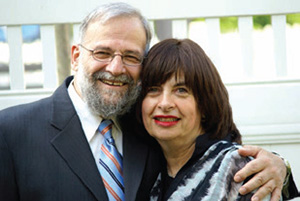

Late in the evening on Sunday we returned from Montreal after spending a long weekend there. Although the drive becomes tedious and boring, especially since we do it so frequently, we drove back with a new energy. Nina had a difficult time refraining from humming the Whitney Houston song “Greatest Love of All” with a smile on her face as she recalled the experience we had in the morning.
Our frequent Montreal visits are part of the agreement we made with each other once we decided that New Jersey would be our new home. We wanted to see our daughter Naama at least every four to five weeks. There is no question that over the years the trek back and forth has become more tiresome, yet somehow upon our return we find ourselves uplifted by the phenomenal atmosphere and beauty of the home that she lives in. It is indeed a miracle.
How can we possibly explain that although handicapped children in a family are a tragedy, there is also an innate beauty and magic in what we learn from them. As we arrived at Maison Shalom—Naama’s group home—we caught the residents in the middle of karaoke. There on a large screen were the words of the song “Greatest Love of All.” A microphone was passed around from resident to resident to sing along. One has to appreciate that our daughter Naama does not speak. There she was with a microphone in her hand, big smile on her face, singing along in her own language of sound. Next, the microphone was passed to Jeffrey, a full-sized man who is autistic. Generally, when we come into the home he would grunt under his breath, “Hello, Rabbi Glick and Nina.” We watched as he held the microphone, looked at the screen and read each word of the song in a barely audible chant. Next was Robbie, a young man short in stature whose singing voice permeates the room. He knew every word of the song by heart and blasted it out. It was difficult to not be moved by the activity that included everyone, no matter what their disability was. We felt that the sounds filling the room were holy. While going through the motions of partaking in the karaoke activity, Nina was asked by one of the ladies who works at the home if she could speak with her for a few minutes. She actually pulled Nina aside to thank her for having the opportunity to work at Maison Shalom. This woman came to work in the home, when it opened, as a newly arrived Russian immigrant 26 years ago. At the time she knew little if any English. She related how she learned English at the group home and feels as though the home is a haven. Although her friends think she goes to work each day, she explained that she comes to Maison Shalom for peace and comfort. She expounded on how much she had learned from the residents there and wanted to thank Nina for having created such an amazing utopia.
As we drove back to New Jersey we thought of families who have children with special needs who refuse to consider the possibility of “placing” them in an appropriate facility. Unfortunately, these families believe that their children are better off living at home. Life for neither the other siblings in the family nor the parents will ever be in a state of normalcy unless a realization is made that the “special” family members deserve to be with others like themselves. People tend to believe that their children cannot survive without them. We have discovered in our travels throughout the special needs world that nothing could be further from the truth. We have seen this time and time again. We saw cases in Montreal where parents thought they were doing their children a favor by keeping them at home. We saw parents who became elderly and were forced to place their adult children when they were in their 40s, 50s and 60s. They missed the boat in terms of giving their children the opportunity to thrive in an appropriate setting. We find it shocking that in this community that is so supportive of the special needs world there are no residential facilities available for families to place their children with the comfort of knowing they will grow up in a structured, frum environment similar to their homes. Given the chance, despite their disability, group home members slowly bond with each other in a setting that becomes similar to a family. They no longer have to be in homes where everything that goes on becomes challenging for them to be included in. That great challenge is frustrating for the parents of such children and equally as uncomfortable for their siblings. We cannot emphasize enough the significance of establishing such homes and the benefits to everyone involved. Undoubtedly, the greatest benefit would be to the challenged individuals themselves. In the same manner that older children in a family take the steps necessary to become independent of their families by going away to school, renting their own apartments and getting married, so too do our children with special needs deserve to have that right. What we wish for all of the families in this community who are troubled about what step to take in the future with regard to their “special” child is that they will realize what is best for the child and not for themselves. Fast forward several years and imagine walking into a room where your son or daughter is sitting around in a room with a microphone in her hand, singing “Greatest Love of All.” The words and/or the tune might not be recognizable to everyone, but it really does not matter when you see the smiles and joy on their faces.
By Rabbi Mordechai and Nina Glick










